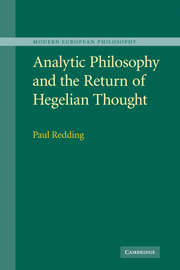Book contents
- Frontmatter
- Contents
- Acknowledgements
- Introduction: analytic philosophy and the fall and rise of the Kant–Hegel tradition
- 1 McDowell, Sellars and the myth of the perceptually given
- 2 Brandom, Sellars and the myth of the logical given
- 3 Individuation and determinate negation in Kant and Hegel
- 4 The Kantian route to Hegel's inferentialism
- 5 Aristotelian Phronesis and the perceptual discernment of value
- 6 Kant, Hegel and the dynamics of evaluative reason
- 7 Hegel and contradiction
- 8 Hegel, analytic philosophy and the question of metaphysics
- Bibliography
- Index
6 - Kant, Hegel and the dynamics of evaluative reason
Published online by Cambridge University Press: 22 September 2009
- Frontmatter
- Contents
- Acknowledgements
- Introduction: analytic philosophy and the fall and rise of the Kant–Hegel tradition
- 1 McDowell, Sellars and the myth of the perceptually given
- 2 Brandom, Sellars and the myth of the logical given
- 3 Individuation and determinate negation in Kant and Hegel
- 4 The Kantian route to Hegel's inferentialism
- 5 Aristotelian Phronesis and the perceptual discernment of value
- 6 Kant, Hegel and the dynamics of evaluative reason
- 7 Hegel and contradiction
- 8 Hegel, analytic philosophy and the question of metaphysics
- Bibliography
- Index
Summary
While Kant called his third Critique, the Critique of Judgement, what the new work added to the critical project was a critique of two specific kinds of judgement – aesthetic and teleological judgements. It was then, at least in its first part, a critique of evaluative judgement, the type of judgement in which a value, specifically an aesthetic value, and not simply a property, was assigned to an object. But on an inferentialist reading of Kant, this would suggest the existence of a type of reasoning within which such judgements operated. After all, for the inferentialist, as Brandom makes clear, a judgement only has the cognitive status of a judgement qua its potential status as move in a reason-giving language game. In claiming, in the Science of Logic, that ‘the syllogism is the truth of the judgement’, Hegel points in just this direction. Indeed, as we will see, his attempts to show the truth of this inferentialist claim is made specifically in the context of judgements of this type. To the extent that the claim of the continuity of the philosophies of Hegel and Kant is to be defended, we would then have to find some justification for thinking of Kant's third Critique as a critique of evaluative reason.
- Type
- Chapter
- Information
- Analytic Philosophy and the Return of Hegelian Thought , pp. 175 - 199Publisher: Cambridge University PressPrint publication year: 2007

